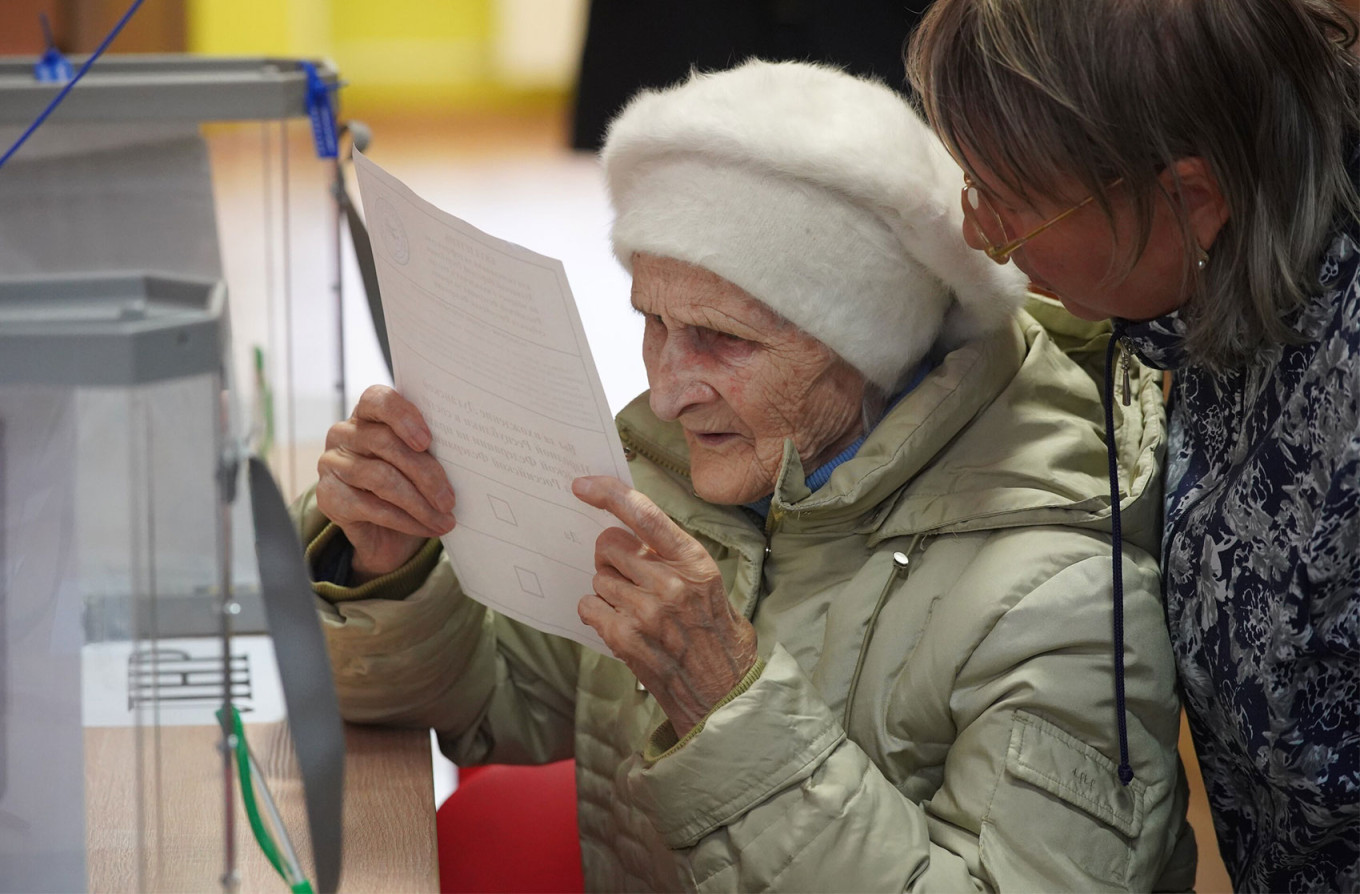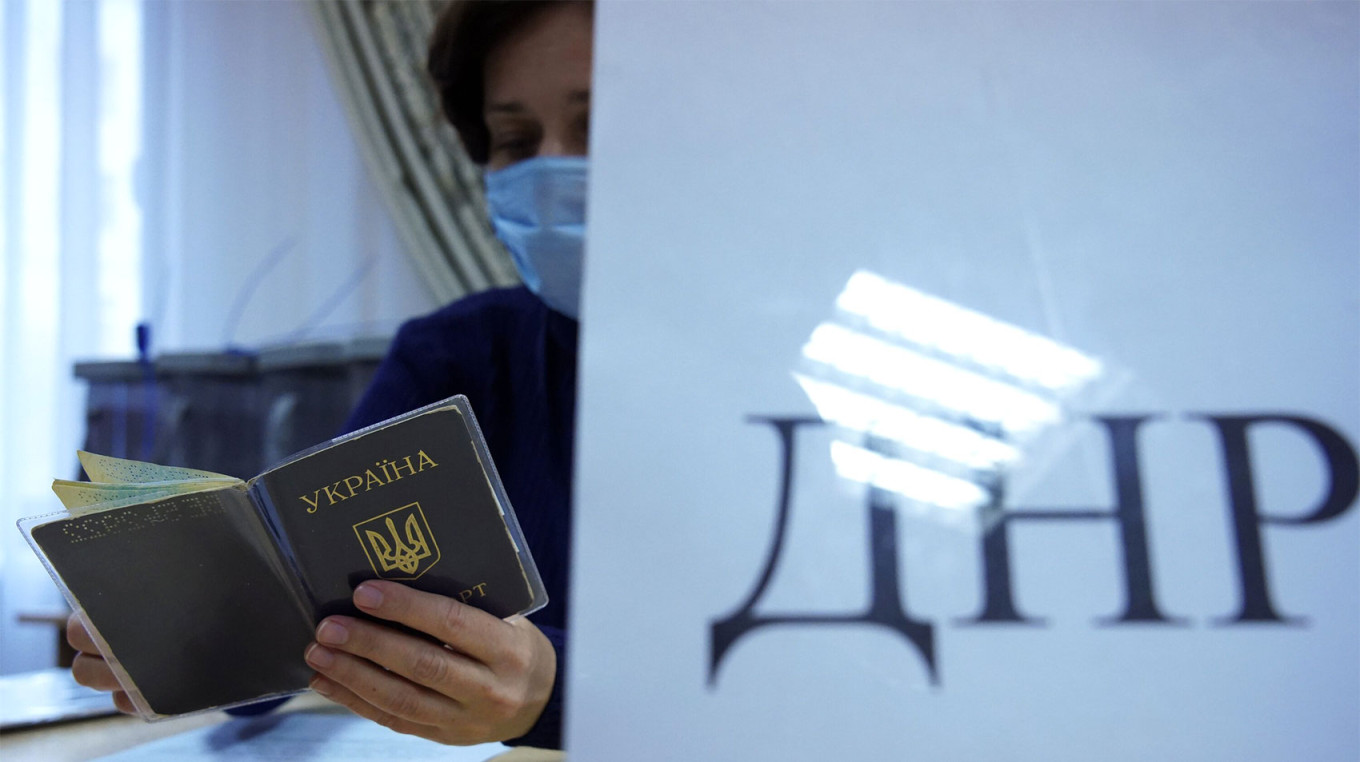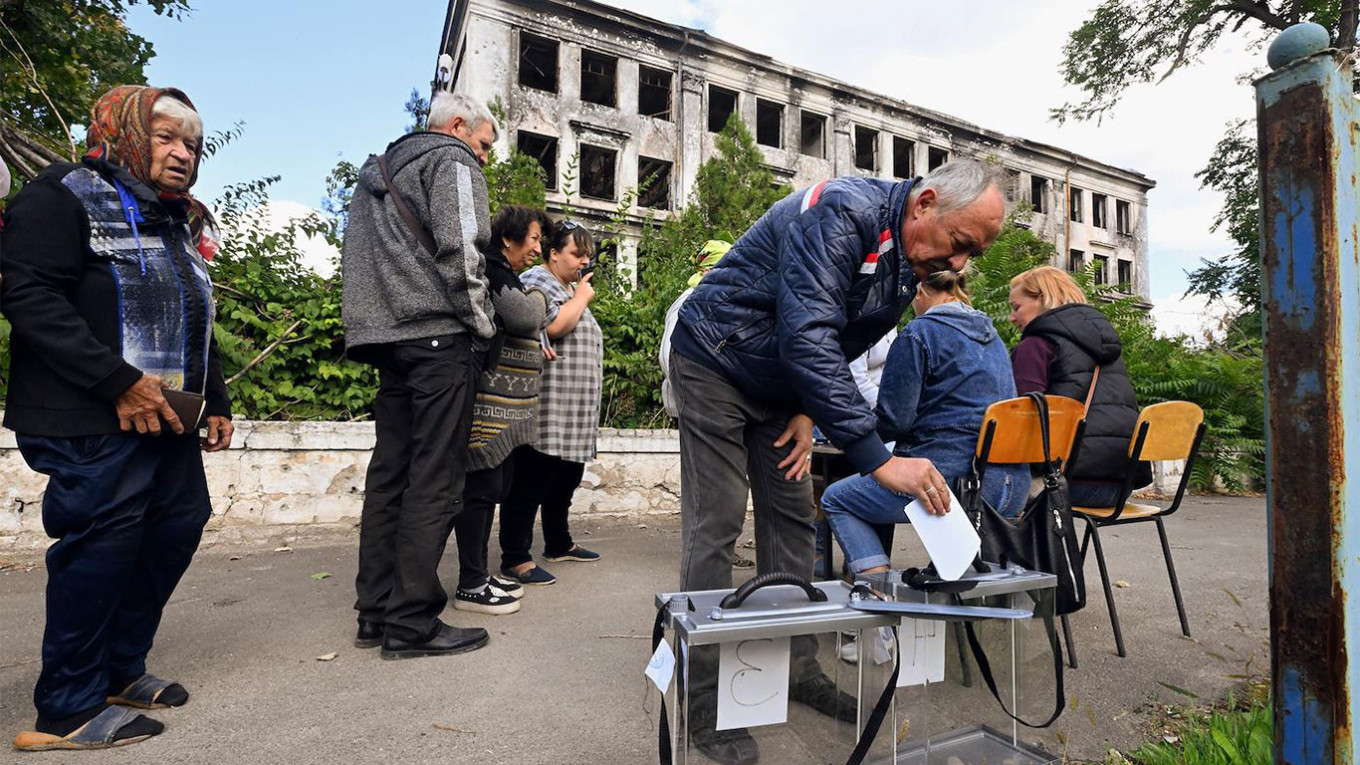Moscow-installed election officials in occupied Ukraine claimed overwhelming support Wednesday for unification with Russia in a series of hasty referendums that have been dismissed by Kyiv and Western countries as a sham.
The votes were held in four Russian-controlled areas of Ukraine — Donetsk and Luhansk in the east of the country, and Kherson and Zaporizhzhia in the south — and are likely to dramatically raise the stakes in the war between Ukraine and Russia.
“Firstly, it will be possible to deploy Russian conscripts to the regions. Secondly, Moscow will once again make nuclear threats,” said political analyst Ivan Preobrazhensky.
“Russia is likely to create a buffer zone there and these territories will become a bargaining chip,” he told The Moscow Times.
The votes, which took place over five days amid ongoing fighting, will likely be used by the Kremlin to annex large swathes of eastern Ukraine and to portray the war — and Kyiv’s recent successful counteroffensive — as an existential threat to Russia.
The self-proclaimed Luhansk People’s Republic voted 98.2% to join with Russia, the Donetsk People’s Republic was 99.23% in favor, Kherson region was 87.05% in favor and in the Zaporizhzhia region 93.1% cast their ballots to become part of Russia, according to results announced early Wednesday.
Independent international observers were not present at polling stations and the referendum results have been roundly dismissed as falsified by Ukraine and its Western allies.
“A large number of people voted at home,” the head of the Zaporizhzhia region’s Russian-installed administration Yevgeny Balitsky said Tuesday in an interview with Russian state-run Rossiya 24 broadcaster. In many cases, election officials accompanied by armed soldiers brought ballot boxes door-to-door.
The exiled Ukrainian mayor of Russian-controlled Melitopol in the Zaporizhzhia region accused pro-Russian authorities of forcing people to cast their votes.

“The voting takes place in front of assault rifles, men with weapons... People are grabbed right on the street and are forced to vote not only for themselves but for their whole families,” Ivan Fedorov told Reuters earlier this week.
“People simply couldn’t vote against the annexation — imagine that you are voting in front of the occupation authorities,” Ukrainian journalist Nick Osychenko told The Moscow Times.
“Many Ukrainians left the area. Others have been living there in total lawlessness for months. Whoever has a gun is right. For some reason, they believe that Russia can give them peace and prosperity,” said Osychenko, who lived in the port city of Mariupol before it was seized by Russian forces in the first months of the invasion.
“It's Stockholm syndrome,” Osychenko added.
Those with pro-Russian views in occupied areas were given blanket coverage by Russian state-run media, which hailed the results of the disputed vote as a landmark moment.
“We are all waiting for peace. With our older brother it will be easier for us,” said one woman at a polling station in Donetsk in unbroadcast footage shared with The Moscow Times.
“For eight years we’ve been on our own. Of course, Russia helped us, but from now we'll all be together,” said a man who voted in Donetsk, referring to Russian-backed separatists’ seizure of power that ignited a war with Kyiv’s forces there in 2014.
The Russian state-run RIA Novosti news agency described the atmosphere in the city of Melitopol as “a real celebration.”

The occupied regions, with a pre-war population of 8.8 million people, are mostly controlled by Russian forces. Since the Kremlin’s invasion of Ukraine, thousands have fled the war-torn territories and experts warned there is no official data on the number of people who stayed.
Moscow also organized polling stations inside Russia, allegedly to allow hundreds of thousands of Ukrainian refugees to take part in the voting.
“We are talking about an imitation organized by the occupied administrations,” said Konstantin Skorkin, a contributor to the Carnegie Endowment for International Peace focusing on the politics of eastern Ukraine.
“Even if there is a certain percentage of pro-Russian people in the occupied territories of Ukraine, it is impossible to call it ‘expression of will’," Skorkin told The Moscow Times.
Even before the end of voting, the head of the Kherson region’s Moscow-backed administration Vladimir Saldo said Tuesday that “the vast majority of those who came to the polling station supported… the exit of the Kherson region from Ukraine and joining Russia.”
The four regions also asked different questions of voters on their ballots.
In Donetsk and Luhansk, voters were asked whether they "support their republic's accession to Russia as a federal subject." Occupied Kherson and Zaporizhzhia meanwhile asked if people "favor the region's secession from Ukraine, creation of an independent country and subsequent accession to Russia as a federal subject."
Ukraine's President Volodymyr Zelensky has said Kyiv would no longer be able to negotiate for peace with Russia following the referendums.
“Russia’s recognition of the pseudo-referendums as ‘normal’, implementation of the so-called Crimean scenario, and yet another attempt to annex Ukrainian territory means that there is nothing to talk about with (the) current Russian president,” he said in a video message to the United Nations General Assembly on Tuesday.
If the Kremlin does press ahead with annexation, Russia will claim sovereignty over about 20% of Ukraine, including Crimea, which was seized in 2014.
The Russian parliament must then approve a treaty formally incorporating the four regions into Russian territory.
Russian President Vladimir Putin is scheduled to address both houses of the Russian parliament on Friday where many expect he will formally declare that the four occupied Ukrainian regions have become part of Russia.
AFP contributed reporting.
A Message from The Moscow Times:
Dear readers,
We are facing unprecedented challenges. Russia's Prosecutor General's Office has designated The Moscow Times as an "undesirable" organization, criminalizing our work and putting our staff at risk of prosecution. This follows our earlier unjust labeling as a "foreign agent."
These actions are direct attempts to silence independent journalism in Russia. The authorities claim our work "discredits the decisions of the Russian leadership." We see things differently: we strive to provide accurate, unbiased reporting on Russia.
We, the journalists of The Moscow Times, refuse to be silenced. But to continue our work, we need your help.
Your support, no matter how small, makes a world of difference. If you can, please support us monthly starting from just $2. It's quick to set up, and every contribution makes a significant impact.
By supporting The Moscow Times, you're defending open, independent journalism in the face of repression. Thank you for standing with us.
Remind me later.







